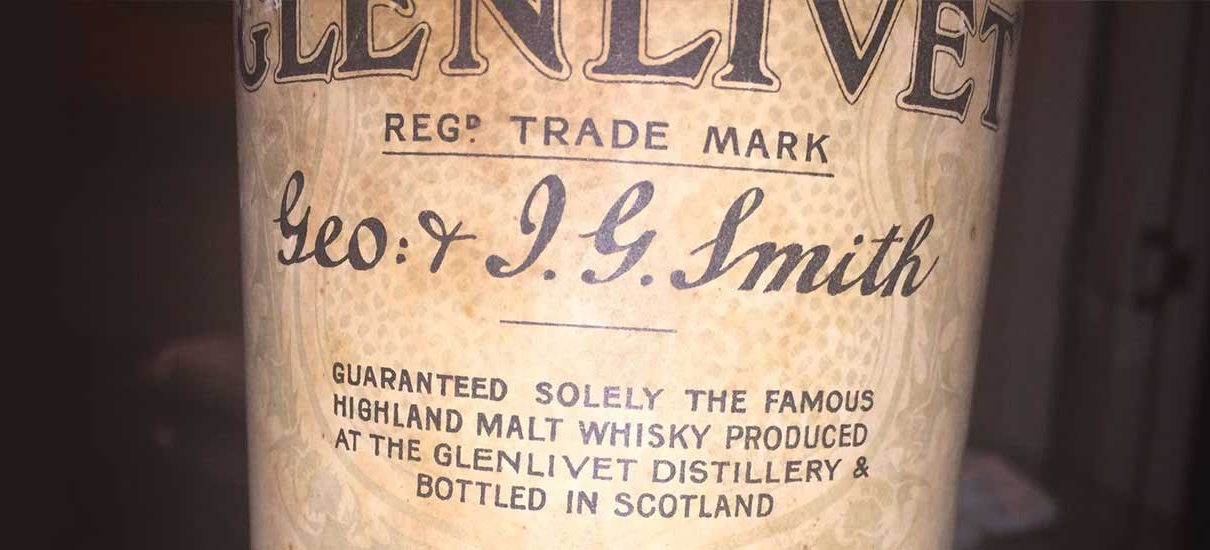
Tracking down a rare bottle of Scotch is not dissimilar to the intrepid adventurers of the late 19th century questing around the world for elusive artefacts. Instead of a hunt for elixirs to an eternal existence, our quest takes us around the world to solve a mystery about a very special bottle of The Glenlivet single malt.
Here at The Glenlivet we have bottles dating back decades but it’s always special when we hear from our Guardians about their unique finds. Of course, we’re always eager to help, as Patrick Noonan discovered when he acquired a rare bottle of The Glenlivet earlier this year:
“I found the bottle at an estate sale in Southern California. It was tucked away in a dark corner of a liquor closet among other rare bottles of whisky. At the time, I had no idea how old or how rare the bottle was, but after a bit of online research, I realised it might be quite special.”
Luckily for Patrick (and us) we have our very own Indiana Jones of the whisky world – archivist extraordinaire Chris Brousseau. There’s not much that Chris doesn’t know about The Glenlivet, so when challenged to uncover information about mysterious bottles of liquid sunshine he really is in his element.
The bottle in question is credited to Edinburgh wine and spirit merchant Andrew Usher (1782-1855). Like so many others in the city, Usher dealt in Scotch whisky and in 1840 became the agent for The Glenlivet’s single malt, from George Smith’s distillery.

Archivist, Chris Brousseau
The Usher connection was to prove a valuable one in the long term. In 1853 Usher began to make a special batch of The Glenlivet called ’Old Vat Glenlivet’. Its popularity in Scotland ensured it made steady inroads into the growing English market.
Chris has determined that Patrick’s bottle was made sometime between 1908 and the early 1930s. The front label of the bottle proved to be the biggest clue as it contained the backdrop of the 1908 registered trademark. Bottling commenced in the early 1930s and so it is most likely to date from that 20-year window.
Accurately dating an old bottle can be tricky as Chris explains:
“Dates are rarely found on the label or packaging, therefore you have to use other clues such as the condition and information on the label – writing, font, the colour and shape of the bottle, comparing the bottle to old trade journals, original trademark information, glass quality and any clues on the packaging all help to refine a search.”

We asked Patrick if he had any plans to open his rare bottle of The Glenlivet:
“I don’t have plans to open or drink the whisky anytime soon. It’s hard to think of a special occasion that would warrant me opening this bottle – but if my first child grows up to be an adult who also enjoys Scotch whisky, I would love to open the bottle to enjoy it with him or her.”
A word of warning to anyone considering opening a historic bottle of whisky – if the bottle is opened for the sake of trying it, it immediately loses its value because, once opened, there is no way of guaranteeing it to be genuine. Also, opening an old bottle will likely damage the cork, and allow the whisky to deteriorate over time, meaning you’d have to drink it. Which, let’s face it, wouldn’t be the end of the world. Just don’t forget to invite us along.
“We are always on the lookout for old bottles of The Glenlivet – we have a good collection from the 1960s onwards but are interested in genuine distillery bottlings as far back as we can get them.” -CHRIS BROUSSEAU, THE GLENLIVET ARCHIVIST
If you own an old or rare bottle of The Glenlivet and would like to find out more information about it, we’d love to hear from you.
TWEET US or join us on FACEBOOK.